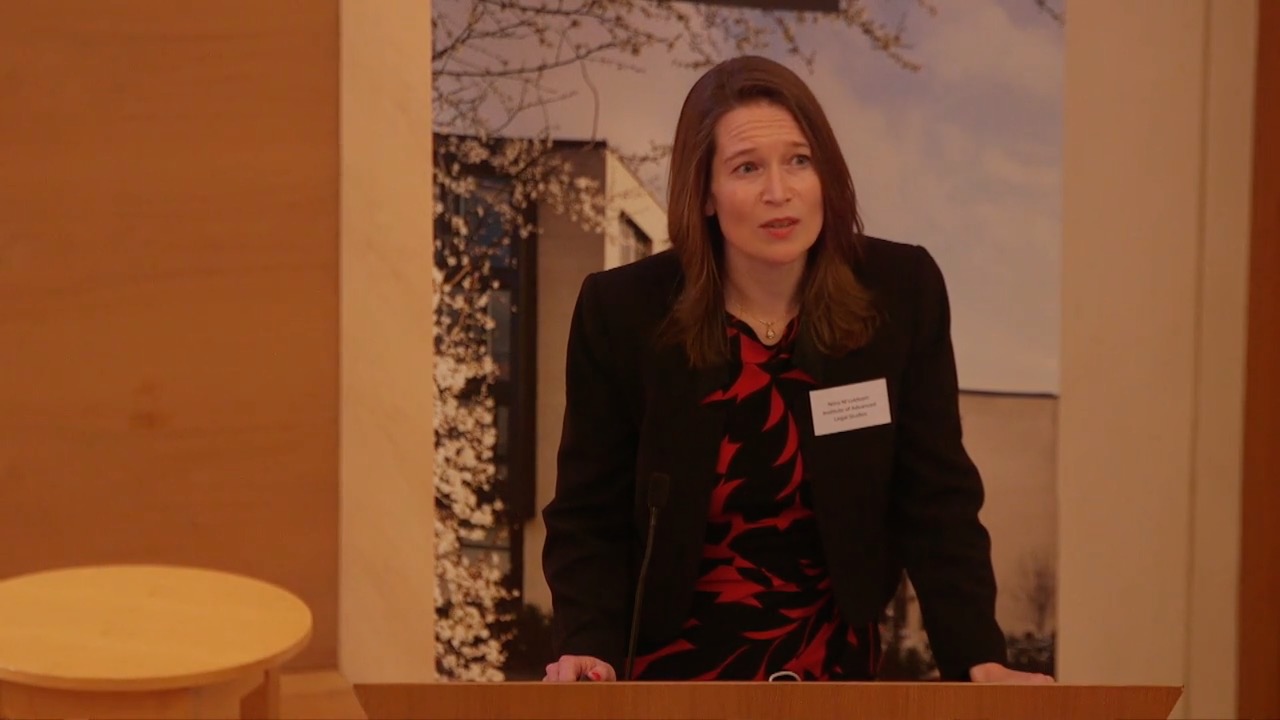Pax Technica: The Implications of the Internet of Things - 24 November 2017 - Panel 3
Duration: 1 hour 16 mins
Share this media item:
Embed this media item:
Embed this media item:
About this item

| Description: |
Panel 3: Privacy
Chair: Dr Daniel Wilson (CRASSH, Cambridge) Dr Nóra Ní Loideain (Director, Institute of Advanced Legal Studies, University of London) Dr Anil Madhavapeddy (Computer Lab, Cambridge) In 2016 Philip Howard, now Professor of Internet Studies at Oxford and a leading scholar on the impact of the Internet on politics, published Pax Technica: How the Internet of Things May Set Us Free or Lock Us Up in which he tried to assess what the long-term implications of this hyper-connected network might be. Among these possible implications, he noted, are: * The IoT is likely to bring a special kind of stability to global politics (analogous to the uneasy stand-off of the Cold War) * The new world order would be characterised by a pact between big tech firms and governments * Governments may have a decreasing capacity to govern the IoT while corporate (and also bad) actors will become more powerful in the hyper-connected world that the technology will create * The IoT will generate remarkable opportunities for society but the security and privacy risks that it could create will also pose formidable problems for society * The IoT looks like an unstoppable juggernaut, so we should learn from our experience with earlier incarnations of the Internet to try and ensure that history does not repeat itself Pax Technica is an ambitious and far-reaching book, and like all such volumes, it raises almost as many questions — about international and national politics, governance, security and privacy — as it answers. The Technology and Democracy project at CRASSH seeks to use the book as a jumping-off point for exploring some of these questions. We will do this in a major one-day public event in Cambridge on 24 November 2017, featuring Professor Howard and invited experts from a number of relevant disciplines. The event will open with a keynote address, after which three panels of invited experts will discuss specific implications of a hyper-connected world. This talk is part of the Technology and Democracy Events series. |
|---|
| Created: | 2017-12-04 09:53 |
|---|---|
| Collection: | Technology and Democracy |
| Publisher: | University of Cambridge |
| Copyright: | Glenn Jobson |
| Language: | eng (English) |
| Keywords: | Technology and Democracy; CRASSH; Daniel Wilson; Nóra Ní Loideain; Anil Madhavapeddy; |
| Abstract: | Panel 3: Privacy
Chair: Dr Daniel Wilson (CRASSH, Cambridge) Dr Nóra Ní Loideain (Director, Institute of Advanced Legal Studies, University of London) Dr Anil Madhavapeddy (Computer Lab, Cambridge) In 2016 Philip Howard, now Professor of Internet Studies at Oxford and a leading scholar on the impact of the Internet on politics, published Pax Technica: How the Internet of Things May Set Us Free or Lock Us Up in which he tried to assess what the long-term implications of this hyper-connected network might be. Among these possible implications, he noted, are: * The IoT is likely to bring a special kind of stability to global politics (analogous to the uneasy stand-off of the Cold War) * The new world order would be characterised by a pact between big tech firms and governments * Governments may have a decreasing capacity to govern the IoT while corporate (and also bad) actors will become more powerful in the hyper-connected world that the technology will create * The IoT will generate remarkable opportunities for society but the security and privacy risks that it could create will also pose formidable problems for society * The IoT looks like an unstoppable juggernaut, so we should learn from our experience with earlier incarnations of the Internet to try and ensure that history does not repeat itself Pax Technica is an ambitious and far-reaching book, and like all such volumes, it raises almost as many questions — about international and national politics, governance, security and privacy — as it answers. The Technology and Democracy project at CRASSH seeks to use the book as a jumping-off point for exploring some of these questions. We will do this in a major one-day public event in Cambridge on 24 November 2017, featuring Professor Howard and invited experts from a number of relevant disciplines. The event will open with a keynote address, after which three panels of invited experts will discuss specific implications of a hyper-connected world. This talk is part of the Technology and Democracy Events series. |
|---|---|
Available Formats
| Format | Quality | Bitrate | Size | |||
|---|---|---|---|---|---|---|
| MPEG-4 Video | 1280x720 | 2.98 Mbits/sec | 1.66 GB | View | Download | |
| MPEG-4 Video | 640x360 | 1.92 Mbits/sec | 1.07 GB | View | Download | |
| WebM | 1280x720 | 1.74 Mbits/sec | 994.85 MB | View | Download | |
| WebM | 640x360 | 488.96 kbits/sec | 272.18 MB | View | Download | |
| iPod Video | 480x270 | 493.45 kbits/sec | 274.68 MB | View | Download | |
| MP3 | 44100 Hz | 249.85 kbits/sec | 140.91 MB | Listen | Download | |
| Auto * | (Allows browser to choose a format it supports) | |||||

